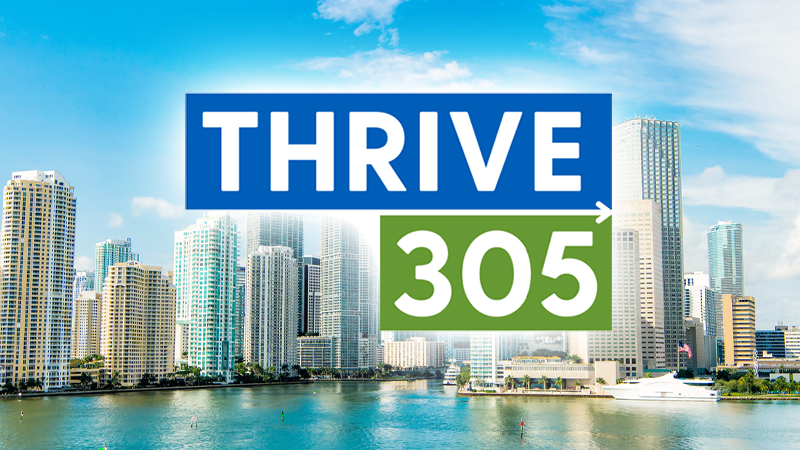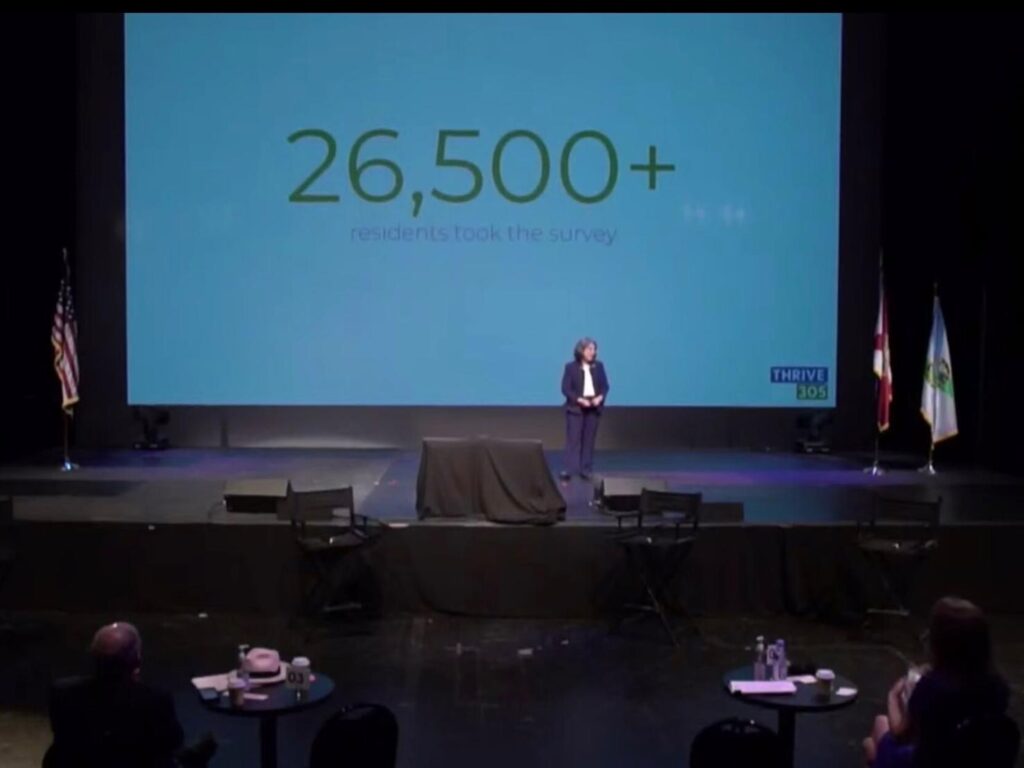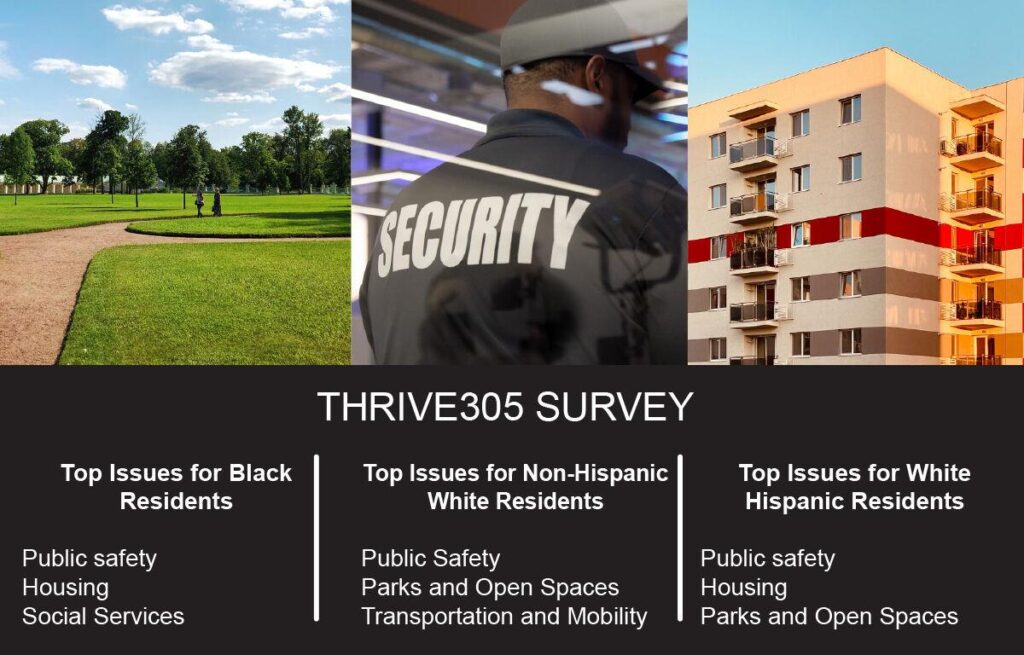
By Bianca Marcof (The Miami Times, Apr 13, 2021) – Forty-six percent of Miami-Dade County residents don’t believe they can influence county decisions that directly impact them. Mayor Daniella Levine Cava wants to change that.
The mayor revealed the results of a countywide survey at the Adrienne Arsht Center on Saturday, including the data point referenced above. More than 26,500 residents from Miami Gardens to Florida City participated in the survey in February. It was created with the intention of bringing local voices to the forefront of what the county administration will focus on, asking individuals to provide input on what they want to see their county look like and what they want local government to do for them.

“The information that we got from this survey is truly going to transform the future of Miami-Dade County,” Cava said.
With a push on social media, the majority of participants took the survey online. To make up for the digital divide, 3,600 people, including residents in Little Haiti, Overtown, Liberty City, Olympia Heights, Homestead and Allapattah, were reached through door-to-door canvassing and phone calls. To account for uneven rates of participation, the county weighted the survey data against U.S. Census information on the reported racial and ethnic breakdown of Miami-Dade County, said Jorge Damian de la Paz, a senior strategist in the mayor’s office. He said the survey is a fair representative sample of residents. A professional research firm specializing in public opinion surveys was not used.
On Saturday, one key takeaway that the mayor highlighted was that parks and open spaces are now a top three priority for many residents. These results are different from those received by a survey conducted by Bendixen & Amandi and The Miami Foundation in January of last year, which found that parks were the least important priority for residents pre-pandemic.
“This signals not just a momentary change, but actually a lasting change in behavior. People want to get outside, they want to be safe, they want to recreate, they want to enjoy our beautiful spaces,” Cava said.
When it comes to top priorities, public safety, housing, and parks and open spaces were the top three for Hispanics and non-Hispanic whites. Among Black residents, social services ranked third after public safety and housing. Parks and open spaces were not a priority.

“One of the best tools that we have, especially for closing the wealth gap with the Black community, which is severely affected, is investment in first-time homebuyer programs, expanding community land trusts that keep housing affordable and reforming our county surtax programs so we can support more homeowners,” Cava said. “My office is moving forward with plans to increase the availability of these housing dollars and activate the funds in an equitable way that will lift up all of our communities.”
She added that for those under 18 years of age, mental health services were ranked the most important resource for health during the pandemic. Telehealth was number one for individuals 85 and older.
The survey also found that 28% of seniors throughout the county do not have access to broadband internet or a computer. In Little Havana, Little Haiti and Overtown, 70% of seniors don’t have computer or internet access.
“Our seniors are being left behind in this digital age. We know that internet connectivity is no longer a luxury, it’s clearly a critical part of our infrastructure. This data clearly shows that we must prioritize greater investment and access to the internet and digital resources,” Cava said.
The top three supported options to improve public safety among all residents are neighborhood improvements, preventing gun violence and reentry services. For non-Hispanic Black Americans, preventing gun violence is the number one priority, while neighborhood improvements is second.
“How do we keep people safe? We have neighborhoods that are safe and are invested, not disinvested,” said Cava. “Fifty-eight percent of our residents believe that making neighborhood safety improvements like better street lighting, fixing vacant lots (and) dilapidated structures is the most important, while Black residents feel that preventing violence should be our top priority.”
Cava also revealed that when asked whether or not the county is a safe and secure environment, Black residents were less likely than others to answer affirmatively.
“We have a real gap here that we must address,” she said.
Saturday’s event kicked off Civic Week, running April 10-17. It marked the next phase of Thrive305, an initiative launched by the mayor in partnership with The Miami Foundation. The week has continued with a series of virtual nightly community conversations since Monday. These moderated discussions have provided residents opportunities to discuss the survey data and recommend ideas for the administration’s upcoming “Action Plan” – a policy framework driven by the community and centered on plans to create a thriving Miami for all residents.
Rahel Weldeyesus, Cava’s senior advisor for innovation and performance, said these sessions are for those who didn’t get a chance to fill out the survey, but want their voices heard.
“We want people to be at the forefront of decision-making,” she said. “We knew we weren’t going to reach everybody through that one survey, so this is an opportunity to give your feedback through this facilitated process.”
The virtual conversations continue tonight with a “Transit & Environment” discussion via Zoom from 6 to 8 p.m. It can be accessed at Thrive305.org.
Thursday, there will be a “Trust & Responsiveness in County Government” virtual session, and the week will conclude with a participatory art project featuring Miami artist Xavier Cortada. He will create a digital art piece that captures residents’ collective voices, answering the question, “What does a thriving Miami-Dade County look like to you?”
The digital message mural will be unveiled at the closing of Civic Week on April 17. Residents can attend remaining events through Thrive305.org.
Link to original article: https://www.miamitimesonline.com/news/thrive305-engagement-guiding-mayors-action-plan/article_3cc676cc-9c8f-11eb-a9e9-8bc87016aec9.html